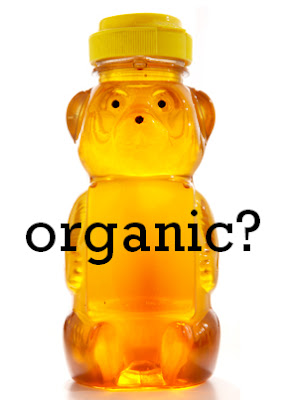Have you ever wondered, what does organic honey actually mean?? It's not a plant that can be sprayed with pesticides. It's not grown in soil with artificial fertilizers. Is conventional honey from bees treated with antibiotics?? I started to wonder, how different can the organic honey be from the non-organic golden goo? Is this just another case of the big bad marketing man trying to fool us innocent consumers?
(Note: I know, I know, it's not vegan. But as I've mentioned before on my blog, I occasionally use local raw organic honey as a sweetener [and facial moisturizer], rather than highly processed, albeit vegan agave syrup from abroad).
Thankfully here in Canada there are quite a few rules being enforced by organic honey certifiers that make organic honey quite different than conventional. Here's what I found out about organic honey standards in Canada:
[Caution: before reading further, only truly organic nerds will find this stuff interesting ...]
- Origin of bees - All bees must come from organic sources.
- Sources of nectar - Sources of nectar and pollen must be mainly from organic plants.
- Location of bee hives - There must be a buffer zone of at least 3000 meters from plants treated with non-organic substances.
- Food - Organic honey must be the main food for adult bees.
- Humane treatment of bees - Adequate honey and pollen must be left in the hive for the colony to survive after the honey is harvested, clipping of the Queen Bee's wings is forbidden, bee smokers cannot contain synthetic materials, destruction of hives after harvest of honey is forbidden, lead-based paints are forbidden.
- Pest Management - Antibiotic drugs are forbidden and only non-synthetic (certifier approved) substances can be used to control pests, parasites and diseases.
- Extraction of Honey - Beekeepers cannot extract honey from a comb with a live brood inside.
- Cleaning - Only organically approved cleaning products can be used.
I definitely feel better buying organic honey after researching all this, and I never would have imagined there are so many guidelines regarding humane treatment. No wonder so many bees have gone missing in the past few years!
Remember that like organic food, organic honey also has a lengthy (and costly) transition period. So if your favourite stall at the farmer's market isn't selling honey with the Canada Organic logo on it, it could be that they are following most of these same rules but are awaiting certification or simply cannot afford it. Talk to them and see how they produce, collect and jar their honey.


6 comments:
Wow, this was really interesting :)
Even for us non-truly-organic-nerds, hahah!
I have an Uncle who's a beekeeper, so the honey is completely eco, which is great. Another thing that's great about him being a beekeeper is that I don't have to buy super overpriced honey from the store. If I can, I usually chose eco instead of regular... but eco stuff here is usually really really expensive and with me being still un employed... But I try :) and try is good, I think.
It's nice to read your posts again and I am really looking forward to the DIY devi bracelet :)
That's awesome that you have a beekeeper in the family ;) Honey, especially the raw organic variety, has become so expensive now, so I always try to buy it straight from a farmer.
I'm working on the bracelet right now ... I will post something very soon.
Thanks for dropping by!
Thanks for all the great info. I just went to the farmer's market this morning and saw some "organic" honey for sale. Of course I thought of you after reading this post. Looking forward to the next one.
Hi Mary. Good to hear that you're putting this info into use in "real" life ;)
Just like you, I occasionally use honey, but try to stick with organic honey. Thanks for the info.
BTW, it's so good to see you back to posting again.
Thanks Shannonmarie. I did feel a little bit weary of posting about honey on a vegan blog, but I've always wondered about how organic it could be.
It's great to be writing again!!!
Post a Comment